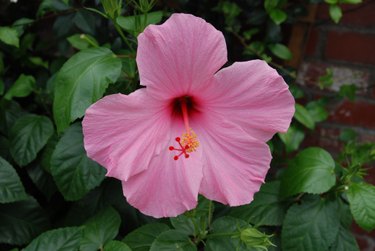
If you own one or more cats, their health and safety should always be your main priority. This includes keeping them away from anything that could harm them, including predators, toxic foods and poisonous plants and flowers. Some species can be fine, but others are toxic to cats, such as the tropical and elegant hibiscus. Sometimes, this can be a real bummer, especially if you want to plant flowers that turn out to be dangerous for these curious, furry friends.
The rose of Sharon hibiscus is toxic to cats, and if they ingest it, you should contact your veterinarian or animal poison control. Some other hibiscus varieties are not toxic, but they still might upset your cat's stomach.
Video of the Day
Video of the Day
Types of Hibiscus Plants
The three most common varieties of hibiscus are the rose of Sharon, Chinese hibiscus and hardy hibiscus. The first one is the most popular, and interestingly enough, all rose of Sharon plants are hibiscus, but not all hibiscuses are rose of Sharon.
The rose of Sharon can grow exceptionally tall, with rows of white, purple and pink flowers with starry red centers that look like bullseyes. They also have dark green shiny leaves and grow and reproduce rapidly. In some places, they naturalize in the wild, and the locals in those parts of the world think of them as weeds. The rose of Sharon is considered an invasive species in four different states.
The Chinese hibiscus has a more tropical look, with very bright-colored flowers. Red is the most common color, but vibrant pinks, oranges and yellows exist. These colors may appear on their own or mix into individual flowers.
Is Hibiscus Toxic to Cats?
The first way to tell the different kinds of hibiscus apart is to look at the colors. Hardy hibiscus has a reputation for having oversize, attention-grabbing flowers that can take over entire plants. You'll see these in pink, white and red shades and less often in yellow, purple or blue. Red centers and muted colors signify rose of Sharon. Bright, intense colors are likely a Chinese hibiscus, and gigantic flowers are a feature of a hardy hibiscus.
Most varieties of hibiscus are safe for pets, but rose of Sharon definitely is not. The flowers and stems of this plant are both poisonous to cats. For dogs, if they eat a good amount of the flowers, they will likely end up vomiting, having diarrhea and feeling nauseous. When a cat or dog ingests part of a rose of Sharon plant, you need to immediately contact animal poison control or your veterinarian.
Other Plants Toxic to Cats
Rose of Sharon is not the only plant that is toxic to cats. Another one is a common houseplant: aloe vera. It's not the inner gel of aloe that's toxic, though; it's the skin on the outside, which is also poisonous for dogs. Also, keep your cats away from oregano, oleander, tomato plants and marijuana plants.
Poisoned cats and dogs may exhibit other symptoms besides nausea, vomiting and diarrhea. Other red flags include highly irritated skin, depression, lethargy and tremors. If you suspect poisoning, remove your pet from the area and see if the animal is breathing and acting normally. Never try to induce vomiting without speaking to an expert and do not administer any home antidotes. You can contact the Pet Poison Helpline by calling 855-764-7661.
- Rozanne and Friends: A Beginner's Guide to Growing Perennial Hibiscus
- All About Gardening: Rose of Sharon vs. Chinese Hibiscus vs. Hardy Hibiscus: Plant Differences & Similarities
- Humane Society of Charlotte: 7 Surprisingly Common Plants That Are Poisonous to Pets
- Pet Poison Helpline: Emergency Instructions